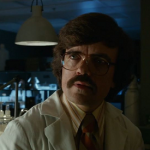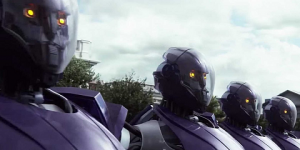Where Marvel Meets Midrash: Powerful Parallels Between Choni the Circle Maker and X-Men: Days of Future Past.
I recently saw X-Men: Days of Future Past (2014), and found the movie to be quite enjoyable and exciting, and unexpectedly moving. Immediately, my mind made a connection between the film and the famous story of Choni HaMeagel (Honi the Circle Maker), which is appearing in the Daf Yomi cycle now (Taanit 23b). I wanted to share some of the similarities between the two stories and bring to light some of the key messages they contain, one of which is very pertinent to the events in Israel occurring right now.
cycle now (Taanit 23b). I wanted to share some of the similarities between the two stories and bring to light some of the key messages they contain, one of which is very pertinent to the events in Israel occurring right now.
In Days of Future Past, a dystopian future era sees the X-Men and other humans hunted and destroyed by the infamous sentinels of the X-Men universe. Wolverine has his mind sent back into a younger version of himself to prevent the events that led to this horrible world[1].
In the story of Choni HaMeagel (Ibid.), a famous sage and prayer master named Choni falls asleep and wakes up 70 years later. He finds the world has developed in a way that didn’t expect. Though he has a living grandson and his wealth of donkeys is still around, his family and his rabbinic study group don’t recognize him. He is saddened by this, prays to G-d, and passes away.
Both stories have the main characters see two different points in a time-line, and this clear juxtaposition causes them to have stark realizations.
 In Days of Future Past, the stark realization relates to the impact that our actions can have in how we are perceived. The X-Men story lines deal with a massive overarching theme: are mutants going to be being accepted by humanity. Mutants and superpowers are fun to watch in movies and read about it comics, but the metaphor of these mythical characters in reference to acceptance is one that highlights the tension between “mainstream” people and people who are different. The issue is whether mutants can integrate into society or should they be viewed as a threat, which is a metaphor that connects directly to minority
In Days of Future Past, the stark realization relates to the impact that our actions can have in how we are perceived. The X-Men story lines deal with a massive overarching theme: are mutants going to be being accepted by humanity. Mutants and superpowers are fun to watch in movies and read about it comics, but the metaphor of these mythical characters in reference to acceptance is one that highlights the tension between “mainstream” people and people who are different. The issue is whether mutants can integrate into society or should they be viewed as a threat, which is a metaphor that connects directly to minority groups such as Jews and African-Americans.
groups such as Jews and African-Americans.
One specific part of this overarching theme is that events that shed poorly on mutants will cause them to be seen in a bad light or be persecuted. In Judaism, this parallels “kiddush Hashem (G-d’s name)”, which is the obligation to show that G-d, his chosen people, and their religion are unique and good. Even just one event can violate this obligation, causing “chillul Hashem” or “profaning/empty vacuum of G-d’s name.”
 The X-Men, led by Professor Xavier, always strive for a “kiddush ha-mutants”, so to speak, while Magneto and his opposing
The X-Men, led by Professor Xavier, always strive for a “kiddush ha-mutants”, so to speak, while Magneto and his opposing Brotherhood give up on peace with humanity and work hard to destroy and enslave humans. Magneto’s view is heavily influenced by his being a victim of the holocaust.
Brotherhood give up on peace with humanity and work hard to destroy and enslave humans. Magneto’s view is heavily influenced by his being a victim of the holocaust.
In Days of Future Past one mutant (I won’t spoil it and say who) has in his or her hand the power to do harm and cause the events that lead to the extermination of all mutants by ever-developing sentinels. When one witnesses this scene, a person can utilize the dramatic presentation to draw inspiration. Each act we do can  have a huge impact on what people think of us and our respective people. Just one deed can cause harm not just to one person, which is significant in its own right, but to many people, and even to ones own entire nation. It’s important to think of every act as an opportunity for kiddush Hashem and one that may have a huge impact–for better or for worse.
have a huge impact on what people think of us and our respective people. Just one deed can cause harm not just to one person, which is significant in its own right, but to many people, and even to ones own entire nation. It’s important to think of every act as an opportunity for kiddush Hashem and one that may have a huge impact–for better or for worse.
“… please do not make us the enemy today.” [Prof X.]
“Look around you, we already are.” [Mutant who wants to murder on live TV]
“Not all of us. All you’ve done so far is save the lives of these men. You can show [the public] a better path.” [Prof. X]
Back to Choni
By comparing two points in a time-line, the Choni Hameagel story is also a call to action in the present.
Because the story of Choni is Midrash, we are not obligated to believe that a miracle occurred and Choni slept for seven decades and survived. Choni was no doubt a real person; however, though G-d can make such a miracle, G-d usually only does such things if there is a great need (i.e. the People of Israel are in trouble)), and a basic aggadaic story in the talmud is not meant to be a historical fact. The message is what’s important in Midrash and Aggadah, not the history.
slept for seven decades and survived. Choni was no doubt a real person; however, though G-d can make such a miracle, G-d usually only does such things if there is a great need (i.e. the People of Israel are in trouble)), and a basic aggadaic story in the talmud is not meant to be a historical fact. The message is what’s important in Midrash and Aggadah, not the history.
The message of Choni Hameagel is that we must take charge now and not be detached from the world. We must personally and properly invest in the future or it will not be the future that we want.
Analyzing the metaphors of this story is crucial; it isn’t a cute Jewish Rip Van Winkle bed time story. A proper analysis understands that it was as if Choni traveled into the future in that he has a stark realization in the present. Choni imagines what life would be like if he would stay on his current course. At that moment in time, he realizes that his current dedication to the next generation will not be enough.
When he sees he has a grandson and donkey wealth, this represents that he will have progeny and has done a good job of setting them up for financial stability. However, not being recognized by his rabbinic colleagues or family represents that his family and colleagues will one day be far away from Choni’s own teachings and unique family style–the two won’t “integrate”.
a good job of setting them up for financial stability. However, not being recognized by his rabbinic colleagues or family represents that his family and colleagues will one day be far away from Choni’s own teachings and unique family style–the two won’t “integrate”.
It makes sense that Choni would become separate from his family and colleagues, and need to rededicate himself, when one remembers the rest of the stories about Choni that are also in Tractate Taanit. He is on a very high religious level, separates himself to be distinct, and uses extra strong, passionate, controversial prayer to bring rain during a drought. He separates himself from the public in standing inside of his circle in order to be outstanding; however. in his turning point, he realizes that he needs to be better connected to the public. This stark realization is learned from a farmer who teaches Choni that carob trees take a very long time years to grow.
“[Choni] said to him, ‘This tree here, how long does it take [to bear fruit]?’ He said to him, ‘It takes 70 years.’ [Choni] said to him, ‘Is it so obvious that you will live 70 years?’ He said to him, ‘I found this world with carobs, just as my forefathers planted for me I also am planting for my son.’” (Taanit, Ibid.)
Just as thousands of people worked hard to set us up with what we have, so must we work hard to give to the next generation. We should volunteer our time to build and arrange things that will last for the next generation. We should work hard and become educated so we can provide properly for our families. If we are parents, we must read books and attend classes to become better parents. The list goes on, and the point is that we must work hard and change ourselves for the better, to better reciprocate the giving, because we were set up with privileges and the next generation deserves the same. If we imagine what life would be life if we do not act–if we compare two “time lines” of our life–we can rededicate ourselves to invest in our family and community right now
point is that we must work hard and change ourselves for the better, to better reciprocate the giving, because we were set up with privileges and the next generation deserves the same. If we imagine what life would be life if we do not act–if we compare two “time lines” of our life–we can rededicate ourselves to invest in our family and community right now
I find Days of Future Past to be quite moving story line, and there is one last message I would like to bring out from it.
There are many people who feel that their future is bleak, like the X-Men in the 1970s we told was their future. People have been through hard times, people are depressed or have anxiety, and others still feel insignificant-the list is long. When we are upset or sad, our mind plays tricks on us. We have negative, when other objective people wouldn’t see them. Our minds insert negative thoughts and imagery, when  objective reality doesn’t contain them.
objective reality doesn’t contain them.
We mustn’t let our minds be a virtual reality head set that create dark and bleak futures. Do what it takes now to create a different future.
I myself used to be depressed, anxious and engage in negative self-talk; negative thoughts would enter my mind daily. But I took my life into my own hands and eliminated those issues and positive thought, thank G-d, usually show up in my mind. Do what it takes to wipe out that future and recreate your two time lines. Engage in positive self-talk; take medication if necessary; seek out a skilled therapist; spend time with positive friends; exercise. The “technology” exists in our generation to wipe out bleakness–overcome your defense mechanisms and create a personal utopian life.
– Ian
[1] In the comics it is Kitty Pryde who goes back, in X-Men: The Animated Series It is Bishop, and in Wolverine and the X-men it is Professor X’s mind.

R’ Bailey,
thanks for great analysis as well as your personal note.
may you experience much good in your life.
AD
My pleasure AD! It makes me happy to share and that you are reading the posts. Amen to your blessing, and may you experience the same, as well as peace and long life.